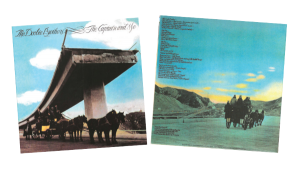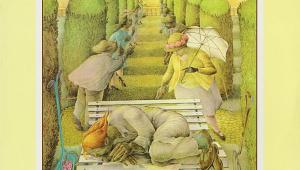David Bowie: Five Years — 1969-1973

“Five years—that’s all we’ve got.” That ominous prognostication, put forth by David Bowie ostensibly about an Earth heading toward imminent destruction in the opening track to 1972’s incendiary game-changer The Rise and Fall of Ziggy Stardust and The Spiders From Mars, also serves as a fitting epigraph for both the core title and scope of this massive box set, the first in what will likely prove to be a series that will go well beyond merely making the grade.
 Rhino, under the Parlophone umbrella, is rolling out a series of Bowie boxes that will represent most, if not all, key phases of the artist’s mercurial and groundbreaking career, and what better way to kick it off than by spotlighting the first half-decade one David Robert Jones inhabited as the character of David Bowie, the genre-busting gender chameleon whom he continues to embody to this day (albeit in a state of semi-retirement).
Rhino, under the Parlophone umbrella, is rolling out a series of Bowie boxes that will represent most, if not all, key phases of the artist’s mercurial and groundbreaking career, and what better way to kick it off than by spotlighting the first half-decade one David Robert Jones inhabited as the character of David Bowie, the genre-busting gender chameleon whom he continues to embody to this day (albeit in a state of semi-retirement).
Five Years is available in a number of configurations, including a 12-CD set, 13-LP set, and high-resolution digital download 192-kHz/24-bit and 96/24 options. In this case, my preferred Five Years listening method has been via the 180-gram vinyl collection, which will also be quite revelatory to any set of ears having been attuned to digital-only Bowie.
“Space Oddity,” the lift-off track of Bowie’s self-titled 1969 debut, initiated our literal spatial relationship with the man, and this 2015 remaster is pure cosmic aural bliss. The right-channel acoustic-guitar fade-in meshes beautifully with Terry Cox’s light-but-deft militaristic drumming in the left, while Bowie’s right-channel lead vocal balances with his left-channel countdowns and counter vocals, with (yes) Rick Wakeman’s masterful mellotron ethereally wafting in and out of all the right spots down the middle. And oh, that swirling 2001-meets-“A Day in the Life” hazy-dreamy ascending outro! The mono single edit of “Oddity” included on the first bonus disc of Re: Call I takes a mellower approach, and while it’s interesting in terms of its relative self-containment and dramatic volume swells, I prefer the stereo version. (More about the totality of Re: Call I in a bit.)
 From there, Bowie took off in our collective cultural consciousness, and he dared us to keep up with his every sonic step. The finer details emerge with each successive listen, like the vocal echo on the near-prog of “The Width of a Circle” and the supplemental percussion on the title track to The Man Who Sold the World (1971). TMWSTW’s broader palette set the table for Hunky Dory (1971) and most importantly “Changes,” wherein Bowie turned and took ch-ch-ch-ch-charge of his creative direction alongside simpatico producer Ken Scott. Listen how the piano figures and strings are held back just enough for the reflective lead vocals to shine on their own during the verses, the way the volume on the choruses and the bridge increases for the proper effect, and the abject air of joy apparent in Bowie’s own elegiacally sweet sax solo that ends the track.
From there, Bowie took off in our collective cultural consciousness, and he dared us to keep up with his every sonic step. The finer details emerge with each successive listen, like the vocal echo on the near-prog of “The Width of a Circle” and the supplemental percussion on the title track to The Man Who Sold the World (1971). TMWSTW’s broader palette set the table for Hunky Dory (1971) and most importantly “Changes,” wherein Bowie turned and took ch-ch-ch-ch-charge of his creative direction alongside simpatico producer Ken Scott. Listen how the piano figures and strings are held back just enough for the reflective lead vocals to shine on their own during the verses, the way the volume on the choruses and the bridge increases for the proper effect, and the abject air of joy apparent in Bowie’s own elegiacally sweet sax solo that ends the track.
And then, Ziggy played guitar. The included 2003 stereo remix of Ziggy Stardust done by original producer Ken Scott remains an improvement—though I do wish the CD box set had also included Scott’s stellar surround-sound mix that’s available in the 2012 Ziggy package. Meanwhile, Live Santa Monica ’72 and Ziggy Stardust: The Motion Picture Soundtrack (1973) capture the unbridled raw energy of the Spiders band, especially guitarist Mick Ronson’s punk-prescient verve and fury on Soundtrack cuts like “Cracked Actor” and “Suffragette City.” But even when Bowie shockingly announced prior to the aptly titled “Rock ’n’ Roll Suicide” that “It’s the last show that we’ll ever do,” the next phase was already underway.
 Aladdin Sane (1973) led that phase, pushing boundaries even further with hard-chargers like “Panic in Detroit” and “The Jean Genie,” though the album’s overall mix from 2013 is a half-step behind the breadth of the others done in 2015. Pinups (1973) followed, and rather than acting as a mere stopgap measure, this covers record re-invigorated early- and mid-’60s classics like Pink Floyd’s dream-dirge “See Emily Play” and The Who’s prepubescent angst anthem “I Can’t Explain.”
Aladdin Sane (1973) led that phase, pushing boundaries even further with hard-chargers like “Panic in Detroit” and “The Jean Genie,” though the album’s overall mix from 2013 is a half-step behind the breadth of the others done in 2015. Pinups (1973) followed, and rather than acting as a mere stopgap measure, this covers record re-invigorated early- and mid-’60s classics like Pink Floyd’s dream-dirge “See Emily Play” and The Who’s prepubescent angst anthem “I Can’t Explain.”
The collection’s added gem is clearly the earlier noted Re: Call I, the double-disc compilation of non-album singles and B-sides. Among its standouts: the frenzious build in the mono single edit of “All the Madmen” and the original, Queen-like Spiders version of “Holy Holy.”
Look out, you rock ’n’ rollers: Our strange fascination with David Bowie is only going to continue to evolve, and Five Years lets us watch that man during his initial growth period rise far above the world.
CD & LP
Label: Parlophone
Audio Format: 44.1-kHz/16-bit PCM Stereo (CD), 192-kHz/24-bit PCM Stereo, 96-kHz/24-bit PCM Stereo (download)
Number of Tracks: 135 on 12 CDs and 13 LPs
Length: 8:46:09
Producers: Nigel Reeve, Jo Blair, Henry Wrenn-Meleck (box set); Ray Staff, John Webber (transfers and mastering); David Bowie, Gus Dudgeon, Tony Visconti, Ken Scott, Richard Kimball, Claudio Fabi (original albums and bonus material)
Engineers: Ken Scott, Malcolm Toft, Barry Sheffield, Gerald Chevin, Eddy Offord, Mike Moran, Denis Blackeye
- Log in or register to post comments





























































